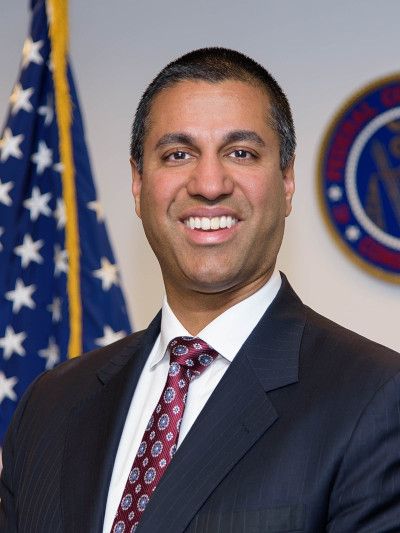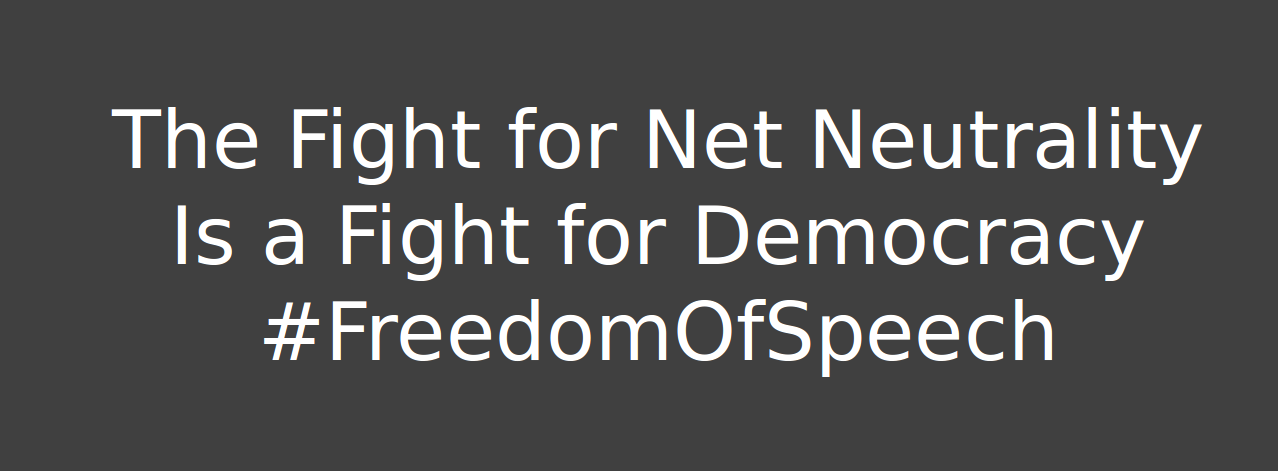Net Neutrality Round 2: A Win for Internet Freedom
The Fight for Net Neutrality Is a Fight for Freedom of Speech and Democracy
We had a win for privacy and internet freedom that does appear to be flying a bit under the radar due the on-going events and conflicts around the globe. As of October 19th 2023, the Federal Communications Commission has ruled to move forward with reinstating strong net neutrality legislation after allowing for public comment.
Experts believe that a vote on “Safeguarding and Securing the Open Internet”, a law that protects net neutrality, will commence in early 2024. The move is not a simple requirement to treat all internet traffic equally, but rather reclassifies the legal classification of internet service providers themselves. The move would shift ISPs from existing as an “information service” to the status of “common carriers”, a status that includes increased government oversight. This isn’t a new form of regulation and has applied to telephone providers for decades. This kept phone companies from prioritizing their own traffic while dropping calls from other service providers to a lower priority tier.
The same regulation applied to internet service providers (ISPs) means net neutrality has a real chance now!
Introduction
What is net neutrality
A free and open Internet depends on all data being treated equally, no matter what site or company the data comes from. It is a basic principle to protect freedom of speech online.
Equal access to web content
The internet has grown into an ever more centralized space where content is becoming increasingly locked behind account login pages and paywalls. In a cut against this trend of decreasing access to online content, the Federal Communications Commission (FCC) earlier this month has started the process of establishing concrete federal laws which will protect net neutrality and prevent ISPs from introducing predatory practices such as bandwidth throttling.
Equal access to web content and other online services guaranteed with Net Neutrality is crucial to keeping internet functionality in-line with our democratic values.
Take away power from companies
If companies can regulate citizens’ access to information, this is a slippery slope which could allow corporate bigwigs to control the flow of information at the whim of the highest bidder. If a company is caught up in a major scandal, a quick PR payment to major ISPs would limit their customers from accessing news sites reporting on their wrong-doing.
It is clear the potential for abuse such a system could be twisted towards. For the freedom of speech and expression, the cornerstone of American political identity, to exist on the internet it is crucial that ISPs remain neutral in their handling and prioritizing of internet traffic. It doesn’t matter which side of the aisle your politics fall on, Net Neutrality is necessary to maintain your online freedom.
Global impact
Net Neutrality in the US is not just a local affair. Currently, the majority of Big Tech companies are based in the United States and if there are no strong restrictions in place limiting their influence on ISPs and the flow of internet traffic, smaller alternatives may be choked out of the internet market place. Not only would this have an impact on non-US residents trying to access content hosted on US-based server infrastructure, but it also stands to set an example of what forward thinking free internet legislation can look like.
The development of this kind of legislation has a checkered history, with attempts to push through new laws only to have them repealed by following administrations. Let’s take a few moments to bask in this step in the right direction and take a look back at the history of the fight for net neutrality and why we cannot let this momentum stagnate.
A Brief History of Net Neutrality
In the early 2000’s FCC Chairman Mike Powell took steps to solidify a set of standards which would protect consumer rights when accessing the internet. The initial guidelines for this standard were first stated in a speech given at the University of Colorado Law School Symposium on “The Digital Broadband Migration: Toward a Regulatory Regime for the Internet Age”. In this speech he called for the protection of the consumer “Internet Freedoms”: Freedom to Access Content, Freedom to Use Applications, Freedom to Attach Personal Devices, and Freedom to Obtain Service Plan Information. These basic principles set the foundation for future debates and legislation surrounding Net Neutrality.
Unfortunately, without enshrining these principles into law, it wasn’t long before these principles were contorted by industry giants to fit their market goals. In 2007 TorrentFreak reported that ComCast was heavily limiting traffic for BitTorrent uploads. Research led by Andrew Norton was later confirmed by the Associated Press and the Electronic Frontier Foundation pushed the FCC to consider stronger Net Neutrality rules. ComCast settled a class-action lawsuit related to this service restriction for a total of $16 million USD, but would not admit to any wrongdoing in their actions to restrict the BitTorrent protocol. In 2008 the FCC ruled against ComCast, setting a legal precedent that providers cannot restrict or block customer internet traffic as they see fit.
This epic legal ping-pong battle between industry and the FCC continued until in 2015 the FCC passed the Open Internet Order which created fixed standards and designating ISPs as common carriers. This win was shortlived and in the following months a wave of legal appeals were taken up against the FCC.
Fast forward to 2017 when newly appointed FCC Chair Ajit Pai began deregulating the FCC and their role in maintaining Net Neutrality in the United States. Pai’s earlier opposition to the 2015 Open Internet Order is well known, as is his employment history as legal counsel to Verizon Communications.


Luckily, public awareness of the fight for internet freedom and Net Neutrality had grown immensely with social media companies staging internet slow-downs, site-blackouts, and a certain comedian making multiple videos promoting stronger FCC regulations.
In addition, (accidental) blocks of services like Tutanota by American ISPs like At&T and ComCast made the news in recent years and brought a lot of attention to the importance of net neutrality. Such blocks - whether accidental or on purpose - show how significant the consequences would be if ISPs could decide which services users could access or not.
During the call for comments, the FCC fell into further controversy when analysis showed that many of the comments received in favor of stripping Net Neutrality language were sent using boilerplate language or were sent with identical time stamps, an indication of bot activity. A report from Stanford University reviewed unique comments and found that 99% of them were in favor of maintaining the Obama-era policies in support of net neutrality. Subpoenas were issued for further review of this shadowy process. The New York Times and Buzzfeed attempted to gain more information by submitting a Freedom of Information Act request, which was opposed by Mr. Pai on the grounds that it would expose the US to potential cyberattacks.
Regardless of this scandal, Pai’s FCC moved forward with the repeal and in December of 2017 passed the “Restoring Internet Freedom Rules” which removed the common carrier status from ISPs.
Within minutes following this ruling, Mozilla challenged these changes in court and in 2019 the US Supreme Court ruled in favor of the FCC rolling back the laws put in place by the Open Internet Order. However, in this ruling was a silver-lining in that they also ruled that the FCC overstepped in claiming that states or local legislation could not enact their own laws and provisions. California did just this following the FCC’s decision by passing their own state Net Neutrality laws.
Now, on October 19th of 2023, the FCC has re-opened the case to introduce Net Neutrality law back at the federal level. We are currently in the period of public comment, but this is a turn away from the back-stepping which occurred under the Trump-era FCC.
The Importance of Net Neutrality and a Free Internet
A free Internet empowers democratic values and is necessary to combat the manipulation of public knowledge.
Defending net neutrality is like a first step to defend democracy itself. If net neutrality is lost, there is no way of turning back: Big corporations will own the Internet, big corporations will decide what we see online, big corporations will dominate the public opinion, big corporations will dominate any future decision to be made in politics.
The Internet is a magnificent place where everyone can share their ideas, every information can get out and reach an audience easily. This is what has made the Internet so popular compared to streamline media like newspapers and television. It is also a great resource for human rights activists and freedom fighters in oppressing dictatorships.
There the Internet gives people the opportunity to inform the public about violations of human rights and a communication tool to organize protests. In Western democracies the Internet is central as well when it comes to freedom of speech and organizing protests.
This is what the Internet community is doing right now: We protest against taking away our free internet and giving it into the hands of a few large organizations.
Join the Fight for Internet Freedom
The FCC has now proposed a new set of rules currently called “Safeguarding and Securing the Open Internet”. To keep this movement towards a more free and open internet, it is up to you to contact your local and state representatives and senators and voice your support for strong Net Neutrality laws. If we raise our voices together they cannot be ignored.
If you are located in the US or in any US territories, please add your name in support of passing this important piece of legislation.
A fair and equal playing field on the internet is crucial for the growth and spread of private alternatives to Big Tech.

